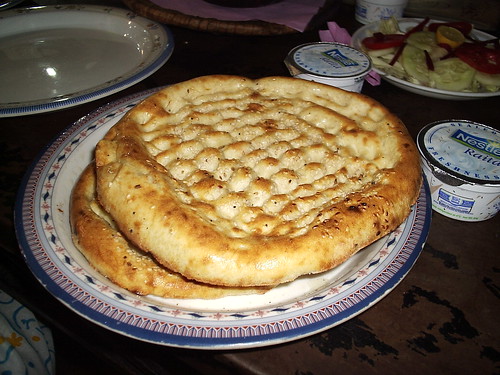Biryanis and Christmas cakes from Pakistan to Europe



http://t3.gstatic.com/images?q=tbn:ANd9GcQtGm4OMa5mTQDKZYlJjopdfnx9k8p08U_FEyiTfEurxpldZphEFGxoznRo; http://images.meredith.com/rrmag/images/recipe/ss_RU190957.jpg; http://goodtoknow.media.ipcdigital.co.uk/111/000005f84/b03c_orh220w334/classic-chic-christmas-cake.jpg https://farm2.staticflickr.com/1185/928445779_066ef51c1a.jpg;
Pakistani Christians have been able to create their own Christmas menu without any conflict with their belief system, combining the best of several worlds. Ladoos, gulab jamans, pala’a and sha’ami kababs had no quarrel with Christmas puddings, roasts and trifles, just as shalwar kameezes, turbans, achkans and suits harmonized with comfort. Christmas trees have always been a minority option.
Pakistani Christians are all converts from Hinduism, Budhism, Islam, Sikhism and Animism. The converts’ pre and post Christian socio-economic parameters continue to overlap the conflicting forces of their pre and post Christian culture.
The outward manifestations of culture can be reduced to the life cycle of birth, marriage, and death, with the addition of the major religious festivals.
Before the creation of Pakistan, these celebrations retained their Hindu bias within a British cultural framework (or vice-versa). After the rebirth of the Indian Christians as Pakistani Christians, being considered a loyal citizen of the Islamic Republic became an imperative of survival. Traces of British or Hindu culture were seen as subversive. Choices were made by families and groups of families, leading to more diversity in cultural practices after partition.
Despite their best efforts, Christians in Pakistan were viewed with a faint whiff of suspicion as a residue of colonialism whose loyalties lay elsewhere. This suspicion formed the moral justification for multi-level and multi-purpose discrimination.

https://azamgill5.files.wordpress.com/2014/12/118af-ceasarcoin4.jpg
The general feeling among Pakistani Christians was that their efforts at giving to Caesar were lost in a bottomless pit. With the concepts of jus soli and jus sanguin non-existant, they were, in de facto terms, illegal aliens in their ancestral homeland. They felt they would be better off in a place where they could succeed through merit without having to look over their shoulders.
That “place” was the West, the Mecca of Pakistanis of all faiths. Many Christians came to Europe by first getting work visas for Saudi Arabia and the Gulf states that provided them with seed money, and then making their way to Europe, an enterprising albeit ironic exit from a lose-lose situation.
In Europe, their identity went unnoticed. Profession of any religion was treated suspiciously, most of all Christianity. Europeans, considered Christians from the former colonies an embarrassment. They were living reminders of a period they were being educated to abhor. And besides, life was busy.
Yacub Masih, General Secretary of the UK Asian Christian Fellowship in his speech to the House of Lords on 4th February 2005 said: “When I came to this country 30 years ago I was very happy thinking that I am going to a Christian country but I was disappointed … people in this country have no interest in faith … They only know about Santa Claus and Cadbury Easter eggs … .”

http://funmozar.com/wp-content/uploads/2014/12/Santa-Claus-02.jpg
Either ways, the Pakistani Christians in Europe quickly lost their romanticism, and then got down to doing what South Asians are jolly good at — working hard, outpacing rivals, and succeeding in the best of their warrior traditions. Denied access to opportunities in their homeland, they found themselves in a society that just let them get on with it. If they wanted to work longer hours, save, and send their children to the schools that offered them a better opportunity, so be it.
Following September 11, and the July 7, 2005 bombings in the UK, the identity of Pakistani Christians, subsumed within Asians of other faiths and agenda, is viewed with as much suspicion as other brown skins.
So that is why, ensconced in their unique mental space, the Pakistani Christian Christmas menu remains largely unchanged. Even a turkey is properly spiced up, pulao or biryani are a must and ladoos and gulab jamuns compete for table space with mince pies or French bûches.
There is, of course, a tree and there are wrapped up gifts but Pakistani Christians wish each other Happiness rather than Merriment!



Good article, Gill.
LikeLike
Thank you, Cheema.
LikeLike